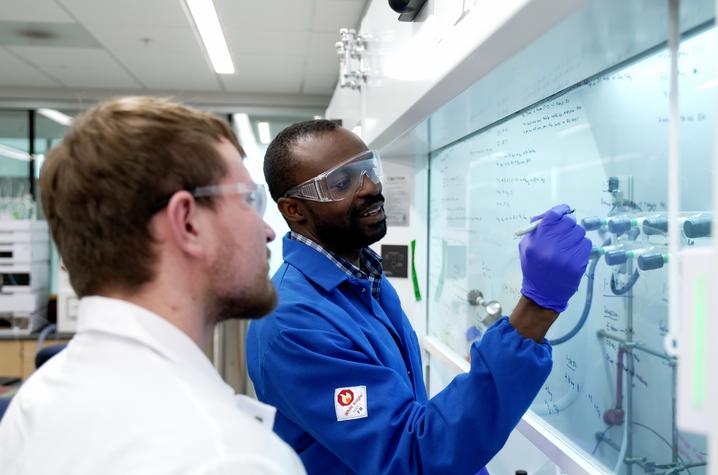‘I am a UK Innovator’: College of Arts and Sciences’ Samuel Awuah
Video produced by UK Research Communications. To view captions for this video, push play and click on the CC icon in the bottom right-hand corner of the screen. If using a mobile device, click on the “thought bubble” in the same area.
LEXINGTON, Ky. (Oct. 16, 2024) — Groundbreaking innovation often leads to discoveries that not only revolutionize but enhance the quality of human life. UK Research Communications partnered with UK Innovate to spotlight faculty innovators with life-changing ideas at the University of Kentucky in a video series “I am a UK Innovator.” UK Innovate works collaboratively with innovators to strategically assess, protect and license early-stage technologies and co-create new technology startups.
In this Q&A, Samuel Awuah describes his work developing gold-based compounds to be used in the treatment of diseases such as ulcerative colitis, traumatic brain injury and various forms of cancer. Awuah is an associate professor in the Department of Chemistry in the UK College of Arts and Sciences and co-leads the Markey Cancer Center Translational Oncology Research Program. He has received research funding from the U.S. National Science Foundation, Kentucky Spinal Cord and Head Injury Research Trust, Crohns and Colitis Foundation of America, National Cancer Institute and American Cancer Society.
UKNow: What inspired you to become a researcher?
Awuah: The thought of providing solutions to diseases that lack effective treatment options brings me immense fulfillment. Moreover, using science to enhance the quality of life for patients is a constant motivation.
UKNow: Describe your innovation involving gold-derived compounds.
Awuah: Our goal is to be able to advance gold-based agents as novel therapeutics to treat diseases including traumatic brain injury. Currently, there are no medications in the clinic that treat traumatic brain injury. We think that being able to generate a molecule that patients can take to mitigate the injury and solve some of the problems that patients face will be a game changer within the field.
UKNow: What have been the most fulfilling moments for you regarding your discoveries?
Awuah: Some of my most rewarding moments have come from the rigorous testing of a hypothesis sparked by curiosity, leading to the discovery of new therapeutic agents or previously unknown mechanisms of drug action.
UKNow: How has your research impacted the way you train students?
Awuah: Our research at the nexus of chemistry and biology has attracted students from all academic levels, ranging from high schoolers to postdoctoral trainees. The potential to drive basic research for clinical gains informs my mentoring to include rigor, creativity and transformational impact.
UKNow: What drew you to the University of Kentucky?
Awuah: The infrastructure for translational research at UK fosters a multidisciplinary and collaborative environment that drives research success. This was a major attraction for me, and I get to experience it daily in my work.

As the state’s flagship, land-grant institution, the University of Kentucky exists to advance the Commonwealth. We do that by preparing the next generation of leaders — placing students at the heart of everything we do — and transforming the lives of Kentuckians through education, research and creative work, service and health care. We pride ourselves on being a catalyst for breakthroughs and a force for healing, a place where ingenuity unfolds. It's all made possible by our people — visionaries, disruptors and pioneers — who make up 200 academic programs, a $476.5 million research and development enterprise and a world-class medical center, all on one campus.




